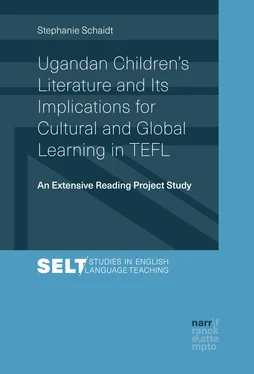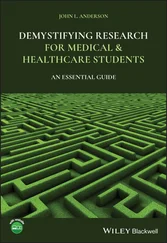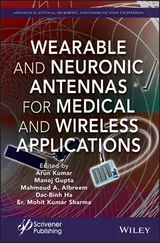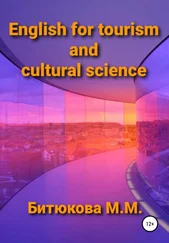In addition, my study intends to give further empirical insights into the mental processes of students who engage with literature in the foreign language. Whereas the studies of Burwitz-Melzer (2003) and Freitag-Hild (2010a) may rather be ascribed to an efficacy study design since they evaluate concrete teaching situations and learning processes in the context of inter-/transcultural learning, my study, similarly to that of Fäcke (2006), looks into individual cases. In line with Fäcke, I argue from a constructivist perspective and aim to reconstruct how the individual students engage with the literature. In contrast to Fäcke’s study, however, my research focuses on the intermediate level of secondary school education (Year 9). Furthermore, it also looks into mental processes with reference to global topics.
As my study uses the framework of an extensive reading project, an overview of studies conducted in the field of extensive reading needs to be provided as well. Empirical studies that focus on extensive reading in a foreign language (Biebricher, 2008; Carrell, 1998; Elley, 1991; Elley & Mangubhai, 1983; Kirchhoff, 2009; Kolb, 2013; Krashen, 1993; Krashen, 1997) examine the impact this reading style has on students’ reading competence in a foreign language, on students’ reading motivation or on their general language proficiency. Bamford and Day (2004, p. 1) summarise some of the effects of extensive reading that are mentioned in the respective scholarship:
Good things happen to students who read a great deal in the new language. Research studies show they become better and more confident readers, they write better, their listening and speaking abilities improve, and their vocabularies get richer. In addition, they develop positive attitudes toward and increased motivation to study the new language.
As far as I am aware, cultural or global learning in connection with extensive reading has not yet been widely researched. Given the potentials of literary texts for cultural and global learning which are commonly listed by scholars (see also Chapter 3.2.), this is rather surprising. A literary text is considered to provide students with opportunities to engage with otherness and different perspectives. It may even lead to changes of perception, it is argued. When students read widely, the amount of possibilities for negotiating otherness also increases and this can have an effect on their cultural or global competence. An empirical investigation of these assumptions is also a major aim of this study.
The intention of this research project is to look into mental processes of Year 9 students in Germany who read Ugandan children’s fiction within the scope of an extensive reading project. It is analysed how students tackle this literature, what significance different contextual factors have on their reading process, and also the potential and limitations of extensive reading projects for cultural and global learning. Both the students’ expectations before the project and their experiences and reflections during and after the reading process are taken into account. For this purpose, I draw on constructivist learning theories (see also Chapter 2.6).
According to constructivist learning theories, learners actively construct their own subjective representations of reality; new information is linked to prior knowledge: “What we already know will interact with new perceptions and explain these perceptions” (Müller, 2000, p. 45). Taking this into consideration, it is important to get an insight into students’ prior knowledge in this study. Since the concept of knowledge is very complex, a full account of students’ prior knowledge cannot be given. The present study intends to provide a glimpse into students’ associations and expectations regarding Uganda and Ugandan children’s fiction before reading the narratives.
A second context which can be seen to have an impact on the students’ mental processes in an extensive reading project is their reading background, i.e. their reading competence1 and reading motivation2. Language difficulties which inhibit the students’ understanding, for example, need to be considered. Furthermore, the general attitudes that the students have towards reading literary texts and their emotions towards the texts they read in the project have to be looked into. These emotions may refer to different aspects of the narratives, i.e. the language or writing style, the plot, the characters or the moral/lesson/theme.
Another context which requires inclusion in this study is the students’ biographical background. According to social constructivism (Berger & Luckmann, 1966; Rogoff, 1990), learners cognitively develop in the context of education and socialisation. Personal experiences may influence the way a student reads a text and, in reverse, a text may initiate reflections upon self. Therefore, information concerning the biographical background of the students needs also to be taken into account.
Concerning the mental processes of the students, I am particularly interested in the following questions:
To what extent do the students construct/deconstruct knowledge and attitudes?
To what extent do they draw comparisons and which similarities and differences do they construct?
What in the texts is ‘foreign’ to them, what do they mark as ‘other’?
Which strategies do they unconsciously or consciously make use of in the reading and understanding process?
To what extent and how do they reflect?
To what extent do their reflections focus on ‘self’; e.g. their own prior knowledge/norms/stereotypes?
Particular emphasis in this study is put on students’ mental processes with reference to so called ‘global topics’, i.e. HIV/AIDS, child soldiers and gender issues (see Chapter 7.3).
5.3 Qualitative Research Design
A qualitative research design is adopted for this study. As Flick (2014, p. 22) points out, “[q]ualitative research is oriented towards analysing concrete cases in their temporal and local particularity and starting from people’s expressions and activities in their local contexts”. Qualitative studies are particularly productive when there is not yet much known about the object of research (exploratory study) and when researchers are interested in the personal background of individuals and the ways in which these construct meaning (ibid., pp 12–13). As Flick (ibid., p. 16) further states, “[q]ualitative research takes into account that viewpoints and practices in the field are different because of the different subjective perspectives and social backgrounds related to them”. A qualitative study, therefore, gives insights into subjective meanings and also demonstrates the variety of perspectives which exist.
The aim of the present research is not the confirmation or determination of ex-ante hypotheses, but instead the exploration of a rather unresearched field. My study looks into subjective perspectives of Year 9 students in Germany on Ugandan children’s fiction and analyses them against the personal background of the individuals.The focus of the research is, therefore, on the case and its specific features. In the second part of the analysis, I then establish some generalisable statements by comparing the various cases. Nevertheless, the research project does not claim to be representative; it focuses on the participants of my study. Therefore, opting for a qualitative research design was meaningful in this context.
Since it is not the aim of my study to generalise, it is irrelevant to what extent the students who participate in the study are representative of a wider group. Therefore, purposive sampling in which “researchers hand-pick the cases to be included in the sample on the basis of their judgement of their typicality or possession of the particular characteristics being sought” (Cohen, Manion, & Morrison, 2011, p. 156) was undertaken.
Читать дальше












